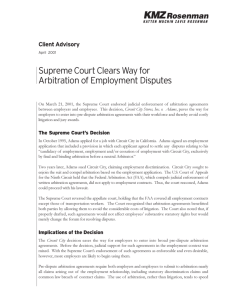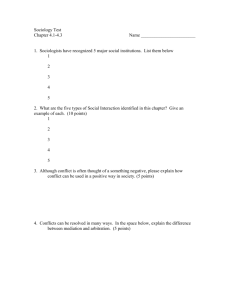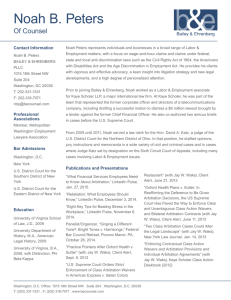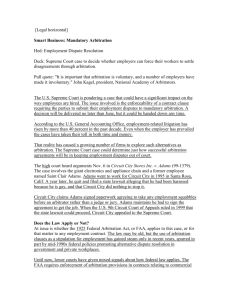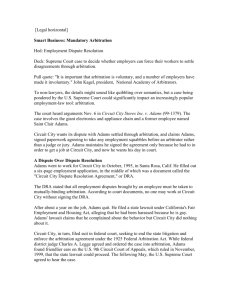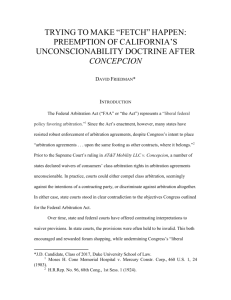Green Bag • Winter 2001 127 Faux Federalism?
advertisement
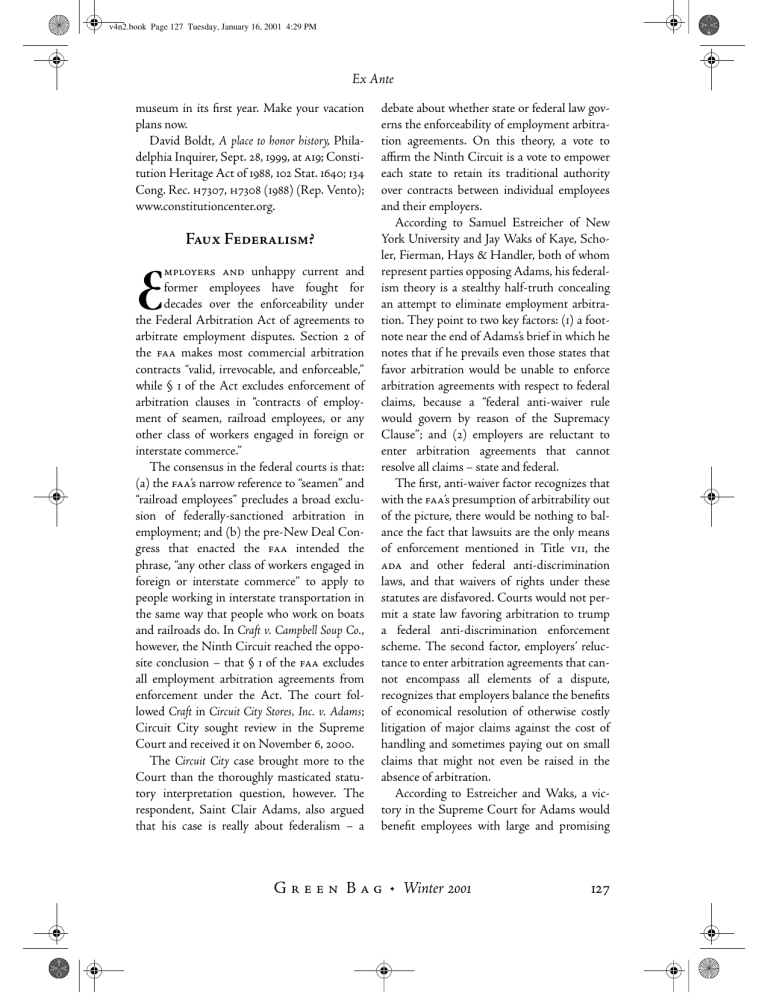
v4n2.book Page 127 Tuesday, January 16, 2001 4:29 PM Ex Ante museum in its Õrst year. Make your vacation plans now. David Boldt, A place to honor history, Philadelphia Inquirer, Sept. 28, 1999, at a19; Constitution Heritage Act of 1988, 102 Stat. 1640; 134 Cong. Rec. h7307, h7308 (1988) (Rep. Vento); www.constitutioncenter.org. Faux Federalism? mployers and unhappy current and former employees have fought for decades over the enforceability under the Federal Arbitration Act of agreements to arbitrate employment disputes. Section 2 of the faa makes most commercial arbitration contracts “valid, irrevocable, and enforceable,” while § 1 of the Act excludes enforcement of arbitration clauses in “contracts of employment of seamen, railroad employees, or any other class of workers engaged in foreign or interstate commerce.” The consensus in the federal courts is that: (a) the faa’s narrow reference to “seamen” and “railroad employees” precludes a broad exclusion of federally-sanctioned arbitration in employment; and (b) the pre-New Deal Congress that enacted the faa intended the phrase, “any other class of workers engaged in foreign or interstate commerce” to apply to people working in interstate transportation in the same way that people who work on boats and railroads do. In Craft v. Campbell Soup Co., however, the Ninth Circuit reached the opposite conclusion – that § 1 of the faa excludes all employment arbitration agreements from enforcement under the Act. The court followed Craft in Circuit City Stores, Inc. v. Adams; Circuit City sought review in the Supreme Court and received it on November 6, 2000. The Circuit City case brought more to the Court than the thoroughly masticated statutory interpretation question, however. The respondent, Saint Clair Adams, also argued that his case is really about federalism – a E debate about whether state or federal law governs the enforceability of employment arbitration agreements. On this theory, a vote to aÓrm the Ninth Circuit is a vote to empower each state to retain its traditional authority over contracts between individual employees and their employers. According to Samuel Estreicher of New York University and Jay Waks of Kaye, Scholer, Fierman, Hays & Handler, both of whom represent parties opposing Adams, his federalism theory is a stealthy half-truth concealing an attempt to eliminate employment arbitration. They point to two key factors: (1) a footnote near the end of Adams’s brief in which he notes that if he prevails even those states that favor arbitration would be unable to enforce arbitration agreements with respect to federal claims, because a “federal anti-waiver rule would govern by reason of the Supremacy Clause”; and (2) employers are reluctant to enter arbitration agreements that cannot resolve all claims – state and federal. The Õrst, anti-waiver factor recognizes that with the faa’s presumption of arbitrability out of the picture, there would be nothing to balance the fact that lawsuits are the only means of enforcement mentioned in Title vii, the ada and other federal anti-discrimination laws, and that waivers of rights under these statutes are disfavored. Courts would not permit a state law favoring arbitration to trump a federal anti-discrimination enforcement scheme. The second factor, employers’ reluctance to enter arbitration agreements that cannot encompass all elements of a dispute, recognizes that employers balance the beneÕts of economical resolution of otherwise costly litigation of major claims against the cost of handling and sometimes paying out on small claims that might not even be raised in the absence of arbitration. According to Estreicher and Waks, a victory in the Supreme Court for Adams would beneÕt employees with large and promising G r e e n B a g • Winter 2001 127 v4n2.book Page 128 Tuesday, January 16, 2001 4:29 PM Ex Ante Richard A. Epstein, Fidelity Without Translation, 1 Green Bag 2d 21 (1997); Samuel Estreicher & Jay W. Waks, Free to Agree?, Legal Times, January 8, 2001, at 51; Br. for Respondent, Circuit City Stores, Inc. v. Adams, U.S. no. 99-1379, p.40 n.19; Circuit City Stores, Inc. v. Adams, 195 F.3d 1131 (9th Cir. 1999) (per curiam); Craft v. Campbell Soup Co., 177 F.3d 1083 (9th Cir. 1999). claims (these plaintiÖs could get lawyers) at the expense of employees with smaller and less promising claims (because the risks and rewards of such cases will not keep bread on the table for most lawyers). We asked them to give us a snapshot of how employer incentives to contract for arbitration would play out under a variety of outcomes in the Adams case and in the state legislatures. Probability of Enforcement Availability of Arbitration Agreement for Entire Employment Disputes Under Current Law Federal Claims State Claims Incentive for Employer to Establish Arbitration Program for Low-Value Claims If faa Drops Out of the Picture Federal Claims State Claims Incentive for Employer to Establish Arbitration Program for Low-Value Claims Federal ArbitrationSupportive State ArbitrationSkeptical State high high high high high high low none low none none none low high low none none none B 128 4 Green Bag 2d 123




